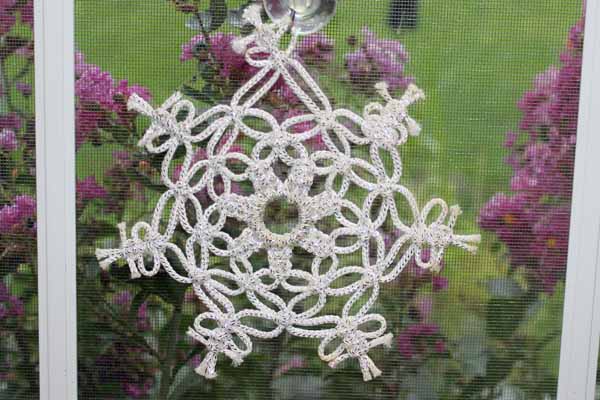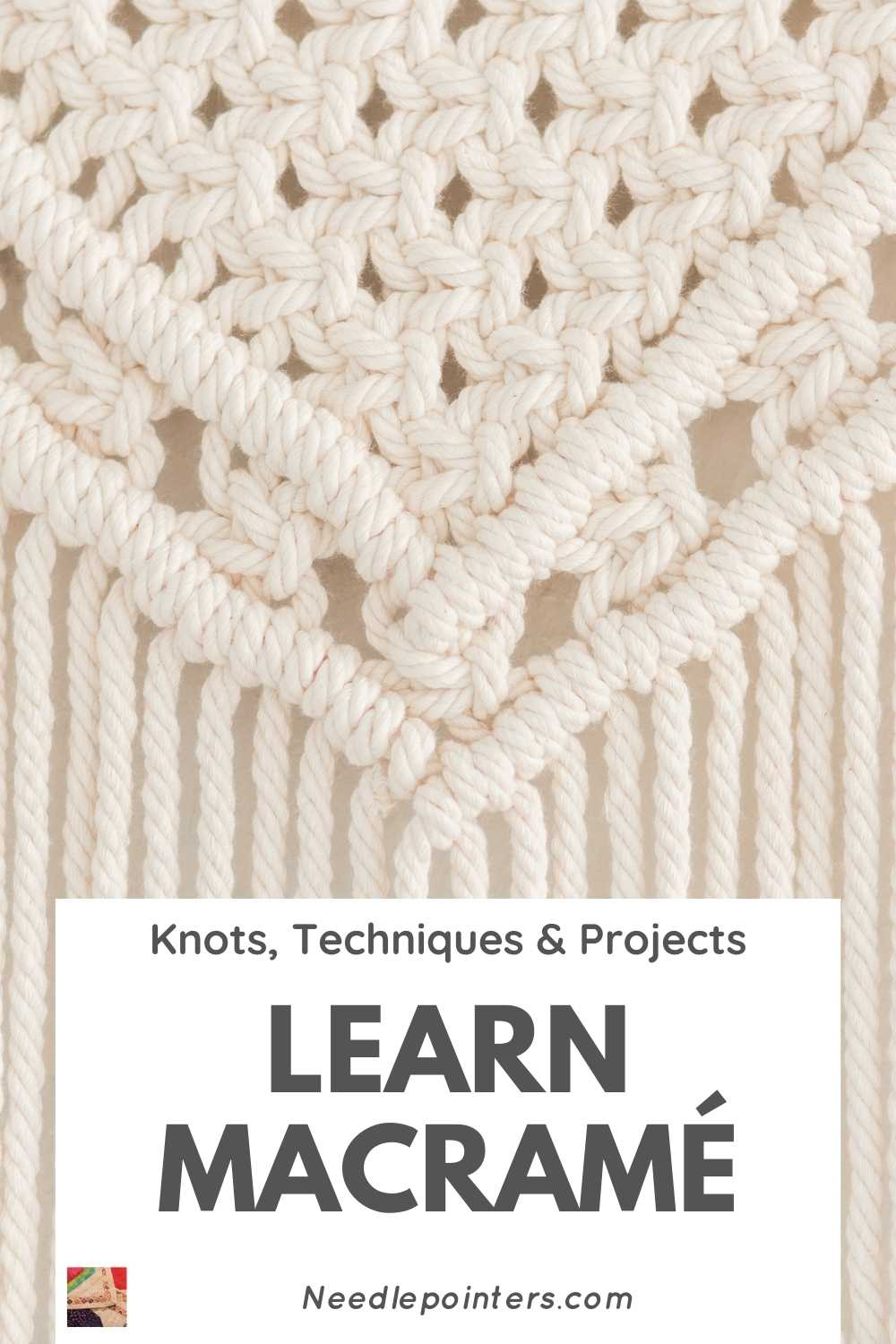Resurgence of Macramé
Macramé, the art of knotting cords made of jute, hemp, cotton, or leather, has made a huge comeback from the 70s.
Read on to learn more about this knotting craft and find knot tying instructions. Macrame books and directions to make your own cording.
You'll find links to instructions for the knots necessary to create beautiful, natural works of art.
As you age, you tend to notice that the clothing that was once popular in your much younger days becomes the hottest new styles decades later.
The same is true in the crafting world.
Just like the art of quilting, which I did with my grandmother during my teens, embroidery which I used to decorate pillowcases when I was young, and cross stitch, which I used to make a beautiful, almost painted-like picture as a gift for my parents, macrame is back in vogue.
What is Macramé?
Macramé is a very unique fiber art. It is made by knotting cords, which come in various gauges, into a beautiful work of art.
Macramé is very different from the needlework arts I mentioned above that use thread, yarn or embroidery floss, although it too uses a string material.
As mentioned above, macramé uses cords made most often of jute, hemp, cotton twine, linen or leather. No needles are used; instead, the crafter ties a series of square and half knots, among others, to create a piece of textile art.
Oftentimes, shells, wooden or glass beads, or dyed cord is used to embellish the masterpieces.
Macramé projects range from very simple to very complex, all of them beautiful. Crafters new to macramé usually find that they can quickly advance to the more complex patterns since only a handful of knots are used in all macramé projects.
Macramé’s History
In the 13th-century, Arab weavers were the first to use macramé. They used knots along the extra thread of the objects that they had hand-loomed, such as shawls, bath towels, veils and rugs, to form a decorative fringe.
After the conquest by the Moors, this method of art was taken to Spain, eventually making its way to Europe. Most historians believe that macramé was introduced to England in the late 17th century by Mary II who taught it to her ladies-in-waiting.
It's important to note that sailors spent their spare hours creating objects using a knotting technique which they called "McNamara's Lace".
They made such things as hammocks, belts, knife covers, and bottle holders. Some of these items, like the bottle holders and knife covers, were used by the sailors themselves; however, many of the knotted creations like hammocks and belts were sold or traded when the sailors made land.
This spread the art of macramé to many other countries such as China and America.
Macramé was most popular during the Victorian era, where you could find many macramé items used decoratively in the beautiful Victorian homes, such as tablecloths, curtains, and bed coverings.
In the 1970s, long after artisans lost interest in the art of macramé, it once again became hugely popular.
Crafters used macramé to create a wide range of items, such as jewelry, wall hangings, plant hangers, purses, tablecloths, bedspreads, and much much more.
By the early 1980s, macramé again lost its popularity and was no longer trendy.
Welcome Back, Macrame!
Today, macramé has risen from the ashes to once again become a popular art of knot tying.
We have listed many links below to Macramé books, kits, knot instructions, and you can find free patterns for various macramé projects on this page. Click here to learn more about knotting.
Now, what type of cord to use to make my daughter one of those lovely plant hangers that she has admired in the stores?

Supporting Products and links: Some of the links below may be affiliate links.
We make a small commission on sales through the affiliate links, at no extra cost to you. Thank you in advance
for your purchase and your support! Please see our full Affiliate
Statement for more information.
|
Get Started In Macrame Book- 11 Stylish Wall Hangings & Other Projects for Beginners. Projects include a necklace, key chain, tote, flip-flops, pillow, table runner, rug and more.
Affiliate Link to Leisure Arts
|
|
|
This step-by-step guide will have you creating your own masterpieces in no time. From home decor to fashion accessories, there is something for everyone.
Affiliate Link to Leisure Arts
|
|
|
Macrame is a beautiful art form that only requires very few tools - Cord, scissor and something to support the project. With these patterns and knots, even beginners can make something special.
By Sarah Wishoff at Most Craft
|
|
|
The Double Half Hitch (DHH) is the primary knot used in Macrame. Learn it here.
Free Macrame Patterns
|
|
|
|
|
Learn how to tie a double half hitch knot that is taught to Boy Scouts at a scouting website.
Scouter Life
|
|
|
With this tutorial learn how to tie the double half hitch knot.
United Knots
|
|
|
Knot instructions, publications, knotting event and more.
International Guild of Knot Tyers
|
|
|
This tutorial will show how to make a spiral knot using only two cords. This knot is also known as the half hitch spiral knot.
Needlepointers.com
|
|
|
|
|
How to collect and prepare dogbane for making Indian Hemp cordage.
Tim Rosanelli YouTube Channel
|
|
|
How to make natural Dogbane Indian Hemp Cordage.
Tim Rosanelli YouTube Channel
|
|
|
How to make the cordage stronger and thicker by doubling the cordage. Learn how.
Tim Rosanelli YouTube Channel
|
|
|
This site shows step by step photo instructions on how to make a beautiful macrame crown knot using four or more groups of cords.
tses Home Page
|
|
|
|
|
Want to know how to do a basic or vintage macrame knot? This is the site. Lots and lots of know instructions.
Free Macrame Patterns
|
|
|
Knots - Simple rope twist I, simple ttwist II, square knot and monks' cord.
Girl Scout Troop 1379
|
|
|
Photos on how to make 20 different macrame knots, including lesser known knots such as the Josephine knot, the interlocking square knot, and the square knot button.
tses Home Page
|
|
|
The larks head knot is a basic macrame knot. Learn how to do the larks head knot and the reverse larks head knot with this tutorial.
Free Macrame Patterns
|
|
|
|
|
How to tie a larks head knot.
The Spruce Crafts
|
|
|
Hang a plant with this unique macrame hanger. This kit includes a 10" wood arrow, cord and instructions.
Affiliate Link to Leisure Arts
|
|
|
Make this beautful macrame butterfly wall art with this kit that includes an 11 1/2" dowel, cord and instructions.
Affiliate Link to Leisure Arts
|
|
|
This Macrame Dictionary will help you learn the terms and abbreviations used in this craft.
Free-macrame-patterns.com
|
|
|
|
|
With the Leisure Arts Macramé Feather Kit, you can create three natural-toned macramé feathers on a wooden dowel.
Affiliate Link to Leisure Arts
|
|
|
24 Easy Macrame projects for Home and Garden
by Amy Mullins, Marnia Ryan-Raison
- Paperback
- Published 2017
Affiliate Link to Amazon
|
|
|
This simple kit by Leisure Arts features white macrame cord and easy-to-follow instructions to teach you how to make a cylindrical basket.
Affiliate Link to Amazon
|
|
|
Glossary of Terms and Abbreviations Commonly used in Macramé
Hub Pages
|
|
|
|
|
Learn three different ways to tie an overhand knot.
WikiHow
|
|
|
The Overhand knot (OH) is the easiest of all the Macrame knots and is found in most patterns.
Free Macrame Patterns
|
|
|
Lots of free macrame projects - plant hangers, animal patterns, fashion items, handbags, home decor and furniture.
Free Macrame Patterns
|
|
|
The Spiral Stitch is also called the Half Knot Spiral, because it's made with 1/2 of a Square Knot. Learn how to make the spiral knot at this site.
Free Macrame Patterns
|
|
|
|
|
Photo tutorial along with written instructions.
Mandala Life Art
|
|
|
Learn how to tie the square knot.
|
|
|
How to do the linen stitch in macrame.
Free Macrame Patterns
|
|
|
Learn how to tie a surgeon's knot by watching our video tutorial and reading our step-by-step instructions.
Needlepointers.com
|
|
|
Learn how to make one continuous strip of t-shirt yarn from old shirts using our video tutorial and step-by-step photo tutorial. T-shirt yarn is also known as T-yarn. Upcycle old tee shirts into yarn and have fun crocheting, knitting, macrame and weaving with it.
T-shirt yarn is a suitable substitute for elastic when making cloth face masks.
Needlepointers.com
|
|
|
Learn how to tie a macrame wrap knot, a really great knot to finish off tassels.
Wool and the Gang
|
|